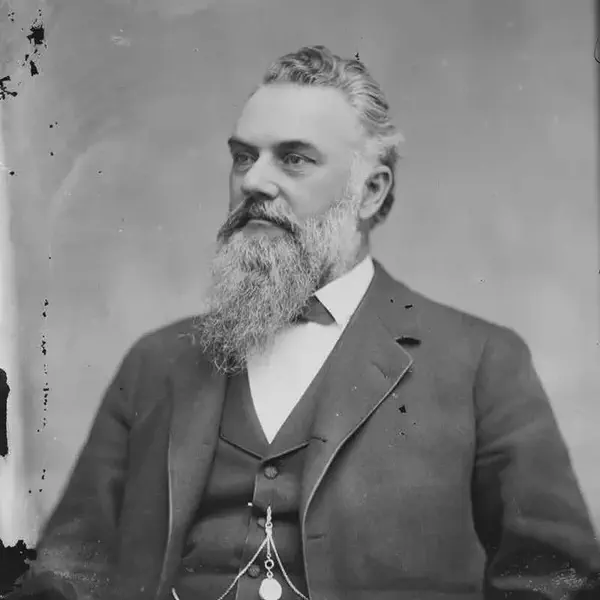
James Graham Fair, Banker, Mining Tycoon and US Senator, Born in Co Tyrone
December 03, 1831
James Graham Fair (December 3, 1831 – December 28, 1894) was an Irish immigrant to the United States who became a highly successful mining engineer and businessman.
His investments in silver mines in Nevada made him a millionaire, and he was one of the famous “silver kings” who became wealthy on the Comstock Lode. Fair later became a real estate investor and railroad builder in California. In 1881, he was elected a United States Senator from Nevada. Nearly all other major so-called robber barons were Protestants (Episcopal or Presbyterian) while Fair himself died a Roman Catholic though born into poverty to Anglican parents.
James Graham Fair, a prominent American figure in the late 19th century, was born on December 3, 1831, in Clogher, County Tyrone, Ireland. Fair would go on to become a successful banker, mining magnate, and a United States Senator.
Key points about James Graham Fair:
Emigration to the United States
Born to a poor Irish family in Clogher, County Tyrone, James Fair came with his father to the United States in 1843 and grew up on a farm in Illinois. There he received an extensive education in business before moving to California in 1850, where he prospected the Feather River country for gold embedded in quartz rather than pan for placer gold.
Success in Mining
His attention shifted to Nevada, where he operated a stamp mill on the Carson River and landed various mine superintendent positions around the Comstock Lode region. He became superintendent of the Hale and Norcross Mine in Virginia City, Nevada in 1867.
Fair found success in mining ventures, particularly in Nevada’s Comstock Lode, one of the richest silver deposits in the United States. He, along with partners, operated the Consolidated Virginia and California Mine.
Bonanza Kings
Fair’s wealth expanded through successful mining operations and various business ventures. He became one of the “Bonanza Kings,” a group of wealthy mining magnates associated with the Comstock Lode.
He formed a partnership with three fellow Irishmen: John William Mackay and the San Francisco saloon owners James C. Flood and William S. O’Brien. The company was formally Flood and O’Brien, but popularly known as the “Bonanza Firm”.
The four made large fortunes in shares in silver mines on the Comstock Lode, the first major silver district discovered in the United States.
In twenty years time the Comstock Lode produced over one hundred million dollars.
The partners controlled and operated various mines on the Comstock, but their greatest success came in 1873 when miners in their Consolidated Virginia mine found the large ore body that became known as “the big bonanza.”
Banking
In addition to mining, Fair was involved in banking. He co-founded the Nevada Bank of San Francisco.
Fair invested his portion in railroads and real estate, bringing his private fortune up to $50 million.
Slippery Jim
Although Fair was acknowledged to be a capable mine superintendent and a shrewd businessman, he was not well liked, and carried the nickname “Slippery Jim.”
Nevada Bank of San Francisco
He invested much of his income from the Comstock in railroads and San Francisco real estate. Fair and Mackay owned the Nevada Bank of San Francisco, a rival to William Chapman Ralston’s Bank of California; after the collapse of Ralston’s financial empire, the Nevada Bank was for a time the largest bank in America at the height of the silver boom.
Political Career
Fair was elected by the Nevada legislature to the U.S. Senate in 1881.
He held this position from 1881 to 1887 and again from 1893 until his death in 1894.
Death
James Graham Fair passed away on December 28, 1894.
Legacy
Fair’s legacy is tied to his success in mining and business during a critical period in American economic history. The Comstock Lode and his mining enterprises contributed significantly to the development of the American West.
James G. Fair’s life and career reflect the dynamic economic and political landscape of the 19th-century United States, marked by the pursuit of wealth through mining and business ventures in the expanding Western territories.